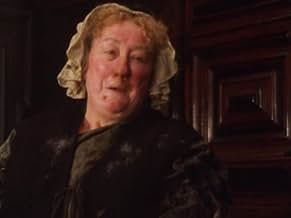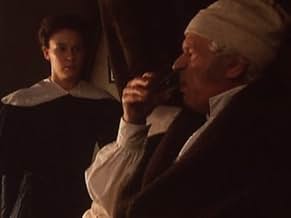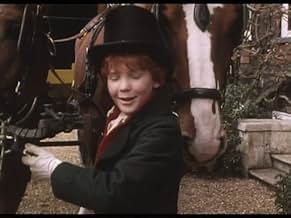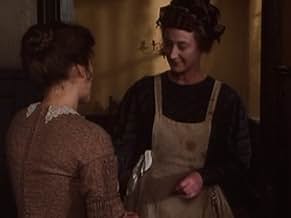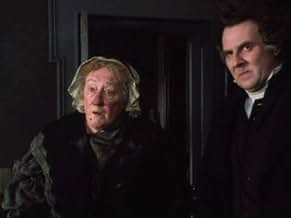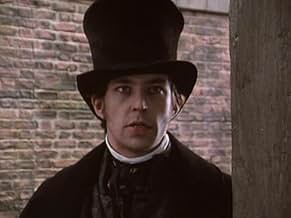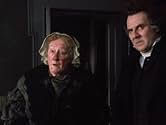CALIFICACIÓN DE IMDb
8.1/10
1.1 k
TU CALIFICACIÓN
Adaptada de la novela de Dickens, narra la historia de unos hermanos que intentan quedarse con la fortuna de su padre.Adaptada de la novela de Dickens, narra la historia de unos hermanos que intentan quedarse con la fortuna de su padre.Adaptada de la novela de Dickens, narra la historia de unos hermanos que intentan quedarse con la fortuna de su padre.
- Nominado a 1 premio Primetime Emmy
- 2 premios ganados y 6 nominaciones en total
Explorar episodios
Opiniones destacadas
10spratton
What an ensemble cast, every one committed and enthusiastic, every one knowing their Dickens, too! Tom Wilkinson is superb --- an actor of many roles, but in this he is fantastic as Pecksniff. Young Martin is perfect (I once saw Ben Walden in Julius Caesar at the Globe)--- a rather spoiled and righteous young man whose tantrums reminded me of Daniel Day Lewis's tantrums in THE NAME OF THE FATHER! Hardest to accept right off are the two Pecksniff sisters, but that's because they are so Dickensian and we are simply no longer accustomed to women being portrayed this way. In the 'small roles', Joan Sims as Betsy Prigg, Elizabeth Spriggs as Mrs Gamp, and Graham Stark as Nadgett -- all hugely-experienced veterans of British broadcasting --- are pure gold. This production did the best it could with such a long book, in dealing with the American episodes -- mostly via letters being read. Nothing more could be done to resolve this difficulty. The late Pete Postlethwaite is a juicy Montague Tigg, as villainous as Keith Allen is terrifying in his Jonas role. There is not a bad casting in it, so let's finish by praising Philip Frank as Tom Pinch -- a role he does so well, so honestly, so unembarrassed, that his many other later appearances on TV are a shock (eg police inspector in "Heartbeat".
In 1842 Charles Dickens was at a critical point in his career. His attempt at a series of stories told by different characters to each other, "Master Humphrey's Clock", was not a success, although it produced a popular novel ("The Old Curiosity Shop"), and a first attempt at a historical novel ("Barnaby Rudge"). He decided to take a trip to the United States.
The results was bad. He found Americans thievish for not giving him copy-write protection. He found them hypocrites for screaming for freedom, but winking at slavery. He found their cities far less acceptable than the English ones. There was less gentility. There was more rough edged belligerence (especially to the old enemy: England). He hated it. He returned to England and wrote "American Notes". The book roundly attacked the Americans. He was not forgiven for years.
He compounded the act in his next novel, "Martin Chuzzlewit", from 1843 - 1844. In this period, ironically, he was to start writing his small Christmas novels, the first of which ("A Christmas Carol") would become immortal - far more than "Chuzzlewit" actually did. But "Chuzzlewit" is regarded by critics as the best of Dickens comic novels. Yet if one person out of five reads the novel today I'd be surprised.
The novel deals with young Martin Chuzzlewit (Ben Walden), who is apprenticed to his cousin the architect Seth Pecksniff (Tom Wilkinson). Pecksniff is the British equivalent of Moliere's Tartuffe - the arch-hypocrite. As "tartuffel" is the term based on Moliere's character, so is the word "peck-sniff" due to Dickens (in "You Can't Cheat An Honest Man", an angry Mr. Belgoody - Thurston Hall - tells off Larson E. Whipsnade - W.C.Fields - calling him both a tartuffel and a peck-sniff). Pecksniff, pretending to be religious and good, back-stabs his way through the novel, stealing ideas from other architects (including Martin), and pushing his plans to gain control over Old Martin (the grandfather of the hero), a wealthy, retired merchant. Old Martin is played by Paul Schofield. Schofield also plays Old Martin's younger brother Anthony, who has a son Jonas (Keith Allen). Jonas wants to inherit too.
Dickens had demonstrated a grasp at the criminal mind in his handling of Bill Sykes and Fagin in "Oliver Twist". But the burglar and the thief trainer were relatively simple types (although Sykes fury at Nancy and his subsequent self-destruction was unique for British literature at that time). Jonas was a higher class criminal - a murderer who did it for money, not anger. He first destroys Anthony, and then goes after his cousin Montague Tigg, a cousin who is a swindler and a blackmailer. The killing of Tigg (whom Jonas ambushes while he is riding in a gig) is based (somewhat) on the murder of William Weare by John Thurtell in 1823. But there is more than that in Jonas. He is rejected by Pecksniff's daughter Charity (nicknamed Cherry / played by Emma Chambers), who subsequently gives in to his courting - only to discover he pursued her to punish her for initially rejecting him. He is blackmailed by Tigg into investing in a financial swindle, and purposely pulls his father-in-law Pecksniff into the swindle because he hates the man. Dickens made Jonas an in depth study of evil, and he becomes a center of fascination in the plot.
Meanwhile Young Martin goes to America when he breaks with the thieving Pecksniff. He goes with his friend Mark Tapley (Steve Nicholson). They find nothing likable about Americans who are nasty brutes for the most part. They have bought land from the Eden Land Company, only to find it is swamp land. The only good point is that young Martin's personality does change - he becomes less selfish because Mark and he have to depend on each other for survival.
The other comic person in the novel is Sairey Gamp (Elizabeth Spriggs), a drunken midwife who assists Jonas at times. She keeps her acquaintance Betsy Prigg (Joan Sims) informed all the time of her best friend, Mrs "Arris". George Orwell puts it into proper perspective: More details are given about Mrs. Harris than found in any biography about a real person - for only the drunken Mrs. Gamp sees Ms Harris. Betsy finally calls her up short on this claiming, "I don't think there is such a person." Horrified, Mrs. Gamp insists there is. Later, a desperate Jonas requires a woman to watch someone - Mrs. Gamp, almost heroically, pushes for Mrs. Harris.
The series was quite good in what it showed from the novel, but it cut out the entire American section - really the heart of the novel as it deals with the hero. It was found to be too negative an image. Whether it was or not it weakened the production. What is left is quite good, but one wishes the American chapters had been left in as well.
The results was bad. He found Americans thievish for not giving him copy-write protection. He found them hypocrites for screaming for freedom, but winking at slavery. He found their cities far less acceptable than the English ones. There was less gentility. There was more rough edged belligerence (especially to the old enemy: England). He hated it. He returned to England and wrote "American Notes". The book roundly attacked the Americans. He was not forgiven for years.
He compounded the act in his next novel, "Martin Chuzzlewit", from 1843 - 1844. In this period, ironically, he was to start writing his small Christmas novels, the first of which ("A Christmas Carol") would become immortal - far more than "Chuzzlewit" actually did. But "Chuzzlewit" is regarded by critics as the best of Dickens comic novels. Yet if one person out of five reads the novel today I'd be surprised.
The novel deals with young Martin Chuzzlewit (Ben Walden), who is apprenticed to his cousin the architect Seth Pecksniff (Tom Wilkinson). Pecksniff is the British equivalent of Moliere's Tartuffe - the arch-hypocrite. As "tartuffel" is the term based on Moliere's character, so is the word "peck-sniff" due to Dickens (in "You Can't Cheat An Honest Man", an angry Mr. Belgoody - Thurston Hall - tells off Larson E. Whipsnade - W.C.Fields - calling him both a tartuffel and a peck-sniff). Pecksniff, pretending to be religious and good, back-stabs his way through the novel, stealing ideas from other architects (including Martin), and pushing his plans to gain control over Old Martin (the grandfather of the hero), a wealthy, retired merchant. Old Martin is played by Paul Schofield. Schofield also plays Old Martin's younger brother Anthony, who has a son Jonas (Keith Allen). Jonas wants to inherit too.
Dickens had demonstrated a grasp at the criminal mind in his handling of Bill Sykes and Fagin in "Oliver Twist". But the burglar and the thief trainer were relatively simple types (although Sykes fury at Nancy and his subsequent self-destruction was unique for British literature at that time). Jonas was a higher class criminal - a murderer who did it for money, not anger. He first destroys Anthony, and then goes after his cousin Montague Tigg, a cousin who is a swindler and a blackmailer. The killing of Tigg (whom Jonas ambushes while he is riding in a gig) is based (somewhat) on the murder of William Weare by John Thurtell in 1823. But there is more than that in Jonas. He is rejected by Pecksniff's daughter Charity (nicknamed Cherry / played by Emma Chambers), who subsequently gives in to his courting - only to discover he pursued her to punish her for initially rejecting him. He is blackmailed by Tigg into investing in a financial swindle, and purposely pulls his father-in-law Pecksniff into the swindle because he hates the man. Dickens made Jonas an in depth study of evil, and he becomes a center of fascination in the plot.
Meanwhile Young Martin goes to America when he breaks with the thieving Pecksniff. He goes with his friend Mark Tapley (Steve Nicholson). They find nothing likable about Americans who are nasty brutes for the most part. They have bought land from the Eden Land Company, only to find it is swamp land. The only good point is that young Martin's personality does change - he becomes less selfish because Mark and he have to depend on each other for survival.
The other comic person in the novel is Sairey Gamp (Elizabeth Spriggs), a drunken midwife who assists Jonas at times. She keeps her acquaintance Betsy Prigg (Joan Sims) informed all the time of her best friend, Mrs "Arris". George Orwell puts it into proper perspective: More details are given about Mrs. Harris than found in any biography about a real person - for only the drunken Mrs. Gamp sees Ms Harris. Betsy finally calls her up short on this claiming, "I don't think there is such a person." Horrified, Mrs. Gamp insists there is. Later, a desperate Jonas requires a woman to watch someone - Mrs. Gamp, almost heroically, pushes for Mrs. Harris.
The series was quite good in what it showed from the novel, but it cut out the entire American section - really the heart of the novel as it deals with the hero. It was found to be too negative an image. Whether it was or not it weakened the production. What is left is quite good, but one wishes the American chapters had been left in as well.
Martin Chuzzlewit is perhaps not Dickens at his best but it has the ingredients that make him such a great author in the first place and it deserves to be better known. This 1994 adaptation is fabulous in all areas, one of the best Dickens adaptations of the past 25 years. The production values are splendidly evocative, not too bleak or too squeaky clean, and the adaptation is shot with natural skill. The dialogue is very Dickenesian, with its fair share of funny and affecting parts, while the story while leaving some things out is compelling and faithful in spirit and style to Dickens, respecting his work rather than disregarding it. The pace is just right, the drama is given time to breathe but there's no signs of tedium, while as to hope from a Dickens adaptation the characterisations are rich. Of the fine performances, Tom Wilkinson dominates, a brilliant performance and he hits the arrogant and hypocritical sides of Pecksniff spot on. Phillip Franks is incredibly moving as Tom Pinch. Paul Scofield's titular character is played with splendid dottiness and the much missed Pete Postlethwaite is superb, and we also have an unforgettably hilarious Elizabeth Spriggs and Keith Allen who has never been better. All in all, an underrated book given classic treatment. 10/10 Bethany Cox
10caalling
This is an excellent adaptation of a fine novel. It is always a pleasure to see Dickens´s novels successfully made into films or TV series, and this version of Martin Chuzzlewit is without question the best adaptation of a Dickens novel that I have seen. Like in most of Dickens´s works the main plot is sometimes a bit difficult to keep track of because of the many secondary plots which attract our attention, but as far as I am concerned this is not a very serious disadvantage, since the far most important element in any Dickens novel is the wide range of interesting and peculiar characters that fill the pages, and since the cast of this TV production of Martin Chuzzlewit manages to make a number of the characters even more fascinating than they are in the book. All the actors and actresses in this TV-series are good; many of them are brilliant. Most remarkable are Tom Wilkinson, Keith Allen, Pete Postlethwaite, Emma Chambers, Philip Franks, Maggie Steed, and Julia Sawalha. Better acting than theirs in this production is not often seen. The entire cast seem in fact to have inspired and brought out the best in each other. An example of a character which has actually become more interesting as a result of the adaptation from novel to TV-series is the character of Jonas Chuzzlewit: Keith Allen´s interpretation lends him an even more profound air of gloomy desperation and twistedness than is expressed by the Jonas we meet in the novel. Pete Postlethwaite´s interpretation of Mr. Montague Tigg is likewise of such high class that it is almost an improvement on the book without being in the least degree unfaithful to it. I really cannot recommend this TV-series enough. People with a taste for Dickens can see it many times and still feel rewarded.
I was absolutely stunned by this BBC-miniseries: it's almost perfect in every way. It succeeded in producing the exact atmosphere of Dickens' novel as I recall it, with all the fine irony, the dark and the good sides of human nature, the description of the beautiful countryside as well as the ugly corners of the big city, the sumptuous costumes, I could go on and on, everything seemed to be in perfect place and exactly right.
Due credit should go to the director and of course to the writer, who did a great job in translating some 700 pages of Charles Dickens into a manageable script. The fact that the whole American section of the novel is left out, didn't bother me that much. In the book it's almost a novel within a novel, and since with the adaptation of novels of this scale one always has to make some concessions, it seemed a sensible choice to comprise the American adventure to one or two short scenes.
As to the actors, they really deserve the highest credit, it's unbelievable how a whole cast can be of such high standards. Tom Wilkinson as the hypocritical, greedy en pompous Pecksniff is absolutely great; equally good and entertaining is Pete Postlethwaite, and I also should mention Elizabeth Spriggs as the scruffy, boozing and ad-libbing Mrs. Gamp, the "nurse" who you wouldn't trust with your worst enemy let alone with a patient! Julia Sawalha (Absolutely Fabulous) and Emma Chambers (Notting Hill) as the Pecksniff-offspring are not only hilarious, but also develop their part in a very convincing and in the end touching way. On the other, more dark side of the spectrum of Dickens-characters, Keith Allen as the ominous Jonas Chuzzlewit is blood-chilling in his portrayal of a cruel and relentless son and husband. And so I could go on, until even such small parts as the spicy young Bailey (Paul Francis - how DO they get such a young kid to play so natural and easy?!).
If any, to me there's only one minor flaw in this production: the role of young Martin Chuzzlewit by Ben Walden. I don't know what to make of it. Here's a young actor with a handsome yet rather uncommon face, an awkward way of acting, and a curious, almost mumbling diction! He seemed a strange choice to play one of the major protagonists in the story. But another reviewer on this site mentioned of him, that he "casts a spell with his eyes and voice", so maybe that's another way of looking at him.
I give this production a heartfelt 10 out of 10.
Due credit should go to the director and of course to the writer, who did a great job in translating some 700 pages of Charles Dickens into a manageable script. The fact that the whole American section of the novel is left out, didn't bother me that much. In the book it's almost a novel within a novel, and since with the adaptation of novels of this scale one always has to make some concessions, it seemed a sensible choice to comprise the American adventure to one or two short scenes.
As to the actors, they really deserve the highest credit, it's unbelievable how a whole cast can be of such high standards. Tom Wilkinson as the hypocritical, greedy en pompous Pecksniff is absolutely great; equally good and entertaining is Pete Postlethwaite, and I also should mention Elizabeth Spriggs as the scruffy, boozing and ad-libbing Mrs. Gamp, the "nurse" who you wouldn't trust with your worst enemy let alone with a patient! Julia Sawalha (Absolutely Fabulous) and Emma Chambers (Notting Hill) as the Pecksniff-offspring are not only hilarious, but also develop their part in a very convincing and in the end touching way. On the other, more dark side of the spectrum of Dickens-characters, Keith Allen as the ominous Jonas Chuzzlewit is blood-chilling in his portrayal of a cruel and relentless son and husband. And so I could go on, until even such small parts as the spicy young Bailey (Paul Francis - how DO they get such a young kid to play so natural and easy?!).
If any, to me there's only one minor flaw in this production: the role of young Martin Chuzzlewit by Ben Walden. I don't know what to make of it. Here's a young actor with a handsome yet rather uncommon face, an awkward way of acting, and a curious, almost mumbling diction! He seemed a strange choice to play one of the major protagonists in the story. But another reviewer on this site mentioned of him, that he "casts a spell with his eyes and voice", so maybe that's another way of looking at him.
I give this production a heartfelt 10 out of 10.
¿Sabías que…?
- TriviaThe madder red and gold print gown Lynda Bellingham (Mrs. Lupin) wears at the inn is the same gown worn by Justine Waddell (Molly Gibson) while walking with Roger at The Towers in Wives and Daughters (1999), and by Emma Pierson (Fanny Dorrit) while visiting the Gowans in Venice in Little Dorrit (2008).
- ConexionesFeatured in The 47th Annual Primetime Emmy Awards (1995)
- Bandas sonorasSymphony No. 9 in E minor Op. 95 'From the New World' II. Largo
Written by Antonín Dvorák
Heard in score during American sequences
Selecciones populares
Inicia sesión para calificar y agrega a la lista de videos para obtener recomendaciones personalizadas
- How many seasons does Martin Chuzzlewit have?Con tecnología de Alexa
Detalles
- Fecha de lanzamiento
- País de origen
- Idioma
- También se conoce como
- Мартин Чезлвит
- Locaciones de filmación
- King's Lynn, Norfolk, Inglaterra, Reino Unido(London street scenes)
- Productoras
- Ver más créditos de la compañía en IMDbPro
Contribuir a esta página
Sugiere una edición o agrega el contenido que falta

